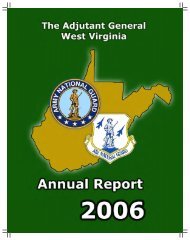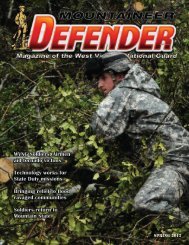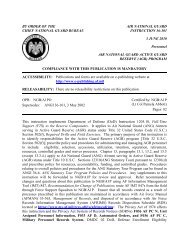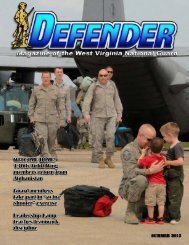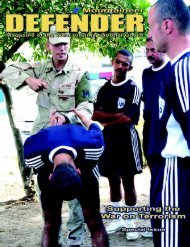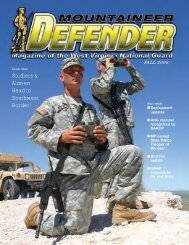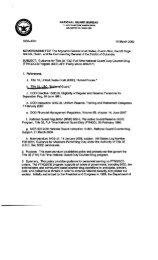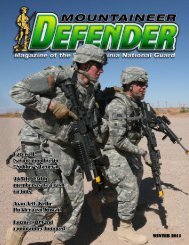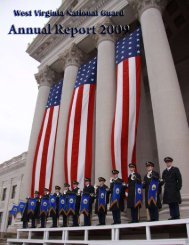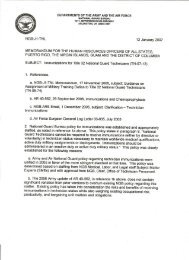Making a Difference - West Virginia Army National Guard
Making a Difference - West Virginia Army National Guard
Making a Difference - West Virginia Army National Guard
- No tags were found...
Create successful ePaper yourself
Turn your PDF publications into a flip-book with our unique Google optimized e-Paper software.
The Adjutant GeneralMaj. Gen. Allen E. Tackett“Never doubt that a small group of committedcitizens can change the world; indeed, it’s theonly thing that ever has.”I ask you to consider those words by respectedAmerican cultural anthropologist MargaretMead in the smaller context of what we do asmembers of the <strong>West</strong> <strong>Virginia</strong> <strong>National</strong> <strong>Guard</strong>.I strongly believe that our organization ofabout 6,800 Soldiers and Airmen is making apositive difference in the lives of those we servein the course of our business.When you look back on the past few months,consider how many people we’ve touched andhow that contact has vastly improved their lives.Winter hit us hard in mid-December whenheavy snowfall shut down the <strong>West</strong> <strong>Virginia</strong>Turnpike and paralyzed much of southern <strong>West</strong><strong>Virginia</strong>. Motorists were stranded for hours onremote sections of the interstate, and thousandsof <strong>West</strong> <strong>Virginia</strong>ns were left without power. Ifnot for Soldiers and Airmen who delivered food,water and blankets to these snowbound individuals,the outcome may have been much different.Early February brought back-to-back blizzardsthat cut off much of northern <strong>West</strong> <strong>Virginia</strong>.More than 800 <strong>Guard</strong> members supported therecovery effort, clearing roads with the Divisionof Highways, delivering food, water, heatingoil, and other supplies to those stranded by thestorms, and transporting home bound patientsfor medical care.While we were still on snow duty, a Navyhelicopter crashed in remote Pocahontas Countyon Feb. 17. Once again, the <strong>Guard</strong> was first onthe scene, and the heroic efforts of our aircrews,flight medics, and local civilian first respondersno doubt saved lives that frigid evening.After reviewing what our <strong>Guard</strong> has doneover the past few months, I hope you understandwhy I’m so proud of you, the outstandingSoldiers and Airmen that choose to serve in the<strong>West</strong> <strong>Virginia</strong> <strong>National</strong> <strong>Guard</strong>. <strong>Army</strong> SoldiersStaff Sgt. Harry Accor and Spc. Derek Folk,who rescued a mother and baby from a home inMorgan County and Staff Sgt. Nicole Hopkinsand Spc. Casey Dunfee who were hoisted to thehelicopter crash site and spent all night keepingsurvivors alive, are often the face of the <strong>Guard</strong>.You are changing the world, and that’s whyI’m so proud to be your Adjutant General. I oftensay that people join the <strong>Guard</strong> because theywant to serve their local communities, and I’mamazed everyday at the job you do. Thank youfor being a member of the <strong>West</strong> <strong>Virginia</strong> <strong>National</strong><strong>Guard</strong>.The State Senior Enlisted LeaderToday I would like to bring to your attentiona program that saved our service members andtheir families more than $22,000 in 2009. Theprogram I am talking about is the CommissaryOn-site Sale Program. Many have takenadvantage of this benefit by shopping at thesale, held in armories across the state.The <strong>Guard</strong>/Reserve On-site Sale Programprovides the commissary benefit to deservingReserve component members, retirees andtheir families who live in areas not closeto an existing commissary. This programbrings a savings of 30 percent or more to ourmembers.Each on-site sale brings different itemsaccording to the season and desires of thepatrons that fill out the sales survey as theycheck out. Yes, you will see many of yourfavorite brand names at a great savings.Another added surprise at many of theon-site sales is free door prize give-a-ways.Recently, during the Charleston armory’s onsitesale, Karen Frazier -- wife of Master Sgt.Tim Frazier of the 130th Airlift Wing -- won anew Kenmore washer and dryer.To learn more about the On-site SaleProgram and other commissary-relatedsubjects, visit www.commissaries.com. YouCommand Sgt. Maj. Vancewill find information regarding on-site salesin your area.Thank you for your support and all you do!The State Command Chief Master SergeantCommand Chief Master Sgt. BoweI would like to talk to you in this issue ofDefender about “fit to fight.” You should beaware that we have a new fitness standardtaking effect 1 July 2010. Our mission requiresus to be physically fit. Being fit can prove tobe the deciding factor between life and deathfor Airmen and their fellow wingmen whencombat actions require extreme physicalexertion. We must constantly hone our physicalfitness abilities to withstand and overcome thedemanding rigors of deployment and combat.I applaud our Airmen who realize theimportance of physical fitness. However, Irealize there are also some who are not livingup to their health and fitness potential.Every Airman is critical to completion ofday-to-day and overseas missions, and weneed each Airman performing at the highestlevel.While working to improve fitness levels,it’s important to realize that simply passingthe annual fitness test is not the Air Forcegoal. Focusing only on the test won’t help asmuch as a mix of cardiovascular, muscularand flexibility training. To successfully boostfitness levels, we must all make regularexercise and a healthy lifestyle a part of ourdaily regimen.In closing, I encourage you to establishpersonal fitness goals and participate in unitand base physical training programs. Youshould also provide assistance to those needingencouragement.The rewards will be obvious and beneficialto all. As always I thank you for all the dailysacrifices you and your family make and ISPRING 20103
Sexual Assault prevention programfocuses on readiness, responsibilityby Capt. Bridget SaundersSexual Assault Preventionand Response OfficerThe <strong>West</strong> <strong>Virginia</strong> <strong>National</strong><strong>Guard</strong> Sexual Assault Preventionand Response Office isresponsible for oversight ofDept. of Defense sexual assaultpolicy.The WVNG is committedto the prevention of sexual assault.The SAPR Office hasimplemented a comprehensivepolicy to ensure the safety,dignity and well-being of allmembers of the Armed Forces.Our men and women servingthroughout the world andhere in <strong>West</strong> <strong>Virginia</strong> deservenothing less. WVNG leaders-- both military and civilian-- are committed to maintaininga workplace environmentthat rejects sexual assault andreinforces a culture of prevention,response and accountability.The SAPR Office works hand-inhandwith the <strong>Army</strong> and Air <strong>National</strong><strong>Guard</strong> and the civilian communityto develop and implementinnovative prevention and responseprograms for survivorsof sexual assault.<strong>National</strong>ly, Sexual AssaultAwareness Month occurs inApril and is designed to raiseawareness and promote theprevention of sexual violencethrough special events andpublic education.The 2010 campaign, “Hurtsone, Affects all,” focused onthe impact sexual assault hason mission readiness. As isunderstood throughout themilitary, mission readinessdefines a unit’s ability to deployquickly and efficiently. Asexual assault can reverberatethroughout a unit and beyond,degrade readiness and impactteamwork.Join the campaign and step forwardto end sexual assault.<strong>West</strong> <strong>Virginia</strong> <strong>National</strong> <strong>Guard</strong> Deployment UpdateAbout 30 Soldiers in the C Co., 2/104th Aviation have been mobilizedfor a one-year tour in Afghanistan. This marks the unit’s fifth overseasdeployment since 9/11.1st Battalion, 201st Field Artillery has been moblized for duty inIraq. Soldiers are expected to deploy overseas later this year.1092nd Engineer Battalion is currently deployed to Afghanistan. Soldiersare expected to return to <strong>West</strong> <strong>Virginia</strong> in Spring 2011.Nearly 165 Soldiers in the 151st Military Police Battalion aredeployed to Iraq. The unit is expected to return later this summer.About 175 Soldiers in the 115th Engineer Battalion are currentlydeployed to Iraq. The unit is expected to return in May 2010.Approximately five Soldiers in the 153rd Public Affairs Detachmentare currently deployed to Afghanistan. The unit is expected toreturn in June 2010.Approximately five Soldiers in the 753rd Explosive OrdnanceDisposal team are currently deployed in support of Operation EnduringFreedom. The unit is expected to return in August 2010.About 130 Airmen in the 167th Airlift Wing have received 240-day,home station mobilization orders to support current and future militaryoperations around the world.More than 25 Airmen in the 130th Airlift Wing are now deployed andabout 200 others will be deployed later this year for various AEF/ECS taskings.4
y Staff Sgt. Sherree Grebenstein167th Airlift Wing Public Affairs OfficeBERKELEY SPRINGS, W.Va. --Necessity has been called the motherof invention.Just ask two <strong>West</strong> <strong>Virginia</strong><strong>National</strong> <strong>Guard</strong> Soldiers who foundthemselves attempting to rescue amother and her four-week-old babystranded at home in Morgan County.Back-to-back blizzards socked theEastern Panhandle with more thanthree feet of snow in some areas.In order to reach the pair in the earlymorning hours of Feb. 10, Staff Sgt.Harry F. Accor III and Spc. DerekC. Folk, medics with the Fairmontbased201st Field Artillery Battalion,fashioned snowshoes from pine treebranches and clotheslines.What makes the feat perhaps evenmore amazing is that Folk, whograduated from Berkeley County’sHedgesville High School in 2005,performed the rescue with threebroken bones in his right hand.During a rescue mission earlier inthe week, the Morgantown Soldiersustained the injury while helpingevacuate a bilateral amputee withPhoto by Staff Sgt. Sherree Grebenstein, 167th Airlift Wing Public AffairsSpc. Derek C. Folk (left) and Staff Sgt. Harry F. Accor III, medics with the 201st Field Artillery Battalion, show off the handmadesnowshoes the pair used while rescuing a mother and baby who had been without power for two days in Berkeley Springs.<strong>West</strong> <strong>Virginia</strong> Soldiers rescue stranded mom, babydiabetes from his home in BerkeleySprings.Maj. Chris Nasser, a member ofthe 167th Airlift Wing, assignedas a military liaison officer at theMorgan County Emergency Servicescomplex, said both Soldiers wereinnovative in their efforts to rescuethe trapped mother and baby.“They made their own handmadesnowshoes to evacuate them,” Nassersaid. “They were really prepared forwhatever they faced.”Accor said that a concernedneighbor alerted officials to helpthe mother and baby who reportedlywere living in a home in the HighlandRidge area that had been withoutpower for two days.Because the snow was so deep-- four to eight foot drifts in someplaces -- the Soldiers were forced tohike for about three miles up a ridgeto the home.The only way they could maneuverthrough the snow without sinkingwas on the snowshoes.Getting the mother and baby backdown the ridge to a waiting Humveewas just as tricky.“We just wanted to get themout of there to safety,” Accor,of Philadelphia, Pa., said, Afterhe got the baby he wrapped it inmore blankets and tucked it in hisrucksack, then placed heated handwarmers around the blankets to keepthe baby warm.Meanwhile, the woman was placedon an emergency medical extractionsked for evacuation.“The whole time I was walkingthrough the snow I was happy thatthe snowshoes didn’t break,” Accorsaid.Once back at the Humvee, theSoldiers transported the mother andbaby to a nearby family home.When asked how they felt abouttheir rescue mission, both Soldierssaid they were just doing what theyare trained to do.“It’s our job,” Accor said. “That’swhat we are here for.”And what about the now famoussnowshoes?Both pairs are expected to beput on display in the battalion’sheadquarters.SPRING 20105
Iron Chefs1201st FSC cooks claim national titlePhotos by Sgt. Mickey Miller, 153rd Public Affairs DetachmentCooks of the 1201st FSC serve troops the meal being judged for the Phillip A. ConnellyExcellence in Food Service competition at Camp Dawson.by Sgt. Mickey Miller153rd Mobile Public Affairs DetachmentKINGWOOD, W.Va. (Nov. 7, 2009) -- <strong>National</strong> <strong>Guard</strong>cooks in the Morgantown-based 1201st Forward SupportCompany took top prize in the <strong>Army</strong>’s Phillip A.Connelly Excellence in Food Service Competition heldin November at Camp Dawson.“This is another indication of how well the unit is doingin all aspects,” said Maj. Gen. John Barnette, LandComponent Commander of the <strong>West</strong> <strong>Virginia</strong> <strong>Army</strong><strong>National</strong> <strong>Guard</strong>. “Soldiers are doing a number of thingsextremely well, and to enter this contest at their busiesttime and win is an indication of their dedication anddiscipline. They’re just outstanding,” Barnette said.The annual competition allows food service personnelto showcase their skills and determine the “best ofthe best” in the <strong>National</strong> <strong>Guard</strong>. Cooks in the 1201stoutscored their peers at state and regional levels beforecompeting with other field kitchen staffs in the nationalcontest.Soldiers moved through their stations with a rhythmthat appeared intensely rehearsed. Runners took ingredientsand handed them to cooks; cooks took ingredientsand prepped them. Chefs called out commands:“I need salt, garlic, and ground black pepper!” As oneSoldier marinated chicken, another diced celery. Communicationbetween the four cooks was like communicationbetween medics on the battlefield. Soldierspreparing food were at the top of their game.Sgt. Brian Hall, first cook for the <strong>West</strong> <strong>Virginia</strong> team,was in charge of making sure everyone followed themenu and each food was prepared at the right time.“This is the best team I’ve had since I’ve been in [themilitary]. I’ve been in nine years and we just flow so[well]. Everyone has got each others’ backs and wework great together. We are all so knowledgeable thatwe catch each others’ mistakes,” Hall said.When preparation was done and Soldiers entered theMobile Kitchen Trailer, they found cucumbers cut tolook like exotic plants garnished with orange peels setaround the serving line. Portions were large and the linemoved quickly. Cooks transformed into servers, loadingplates with rolls and golden brown garlic-roastedpotato wedges. Inside the dining tent, troops smiled,laughed and ate like they had done a thousand timesbefore in military dining facilities around the world.Master Sgt. Franklin Booker, an evaluator for thecompetition, said it was all about the troops.“We want to deter Soldiers getting out in the field andsaying they are tired of eating the same thing over andover,” he said. “Then, Soldiers skip meals and get sick ormalnourished. So we promote good eating habits in thefield by giving morevariety and quality.”Booker explainedhow military cooksare vital to the missionof the <strong>Army</strong>. “NoSoldier can completehis mission withouta healthy diet,” hesaid.<strong>West</strong> <strong>Virginia</strong> is nostranger to the ConnellyCompetition,having already wonfive national titles.But past successesdo not give Soldiersa false sense of security.The unit’scommander, Lt. Col.Pfc. Edward Hutwagner adds a touch of class tothe serving line.Clay Coatney, said troops and command staff take thecompetition seriously.“There is nothing that would ruin morale more thanpoor food. This competition enables a commander ...to demonstrate unequivocally how good a food servicesection you have.”6
Hail!Photos by Lt. Col. Mike Cadle, JFHQ PAOMembers of the <strong>West</strong> <strong>Virginia</strong> <strong>National</strong> <strong>Guard</strong>’s150th Armored Reconnaissance Squadron aregreeted by excited family and friends duringtheir recent welcome home ceremonies inCharleston. The Bluefield, W.Va.-based unitspent the last year deployed in support ofOperation Iraqi Freedom....and farewellSoldiers with the 1092nd Engineer Battalion spend time with their families duringa deployment ceremony Feb. 25 in Parkersburg, W.Va. The unit is headed to FortMcCoy, Wis., for training before departing to Afghanistan in support of OperationEnduring Freedom.SPRING 20107
Spc. Joseph Clark, suspended 165 feet above ground, reaches for a tool while dismantling the communications tower at Camp Al-Taqaddum, Iraq.by Sgt. Jason Means151st Military Police CompanyCAMP AL-TAQADDUM, Iraq(January 2010) -- The tower swayedin a gentle breeze as Spc. JosephClark climbed nearly 165 feet toreach the communications dish.Clark, a Soldier in the <strong>West</strong> <strong>Virginia</strong><strong>National</strong> <strong>Guard</strong>’s 151st MilitaryPolice Battalion, was taskedto remove the dish on a communicationstower as part of the battlehand-off from U.S. Marine forces tothe <strong>Army</strong>. The base was to be turnedover to the government of Iraq.The main dish at the top of thetower was the largest and mostcomplicated piece of equipment tobe removed, and it was to be takendown just days before the base washanded over.<strong>Guard</strong> Soldiers had to improviseto get the job done. “Thankfully,one of the beauties about being a8Citizen-Soldier is that you bringa lot of different skill sets to thetable,” noted Sgt. Jared Major, anon-commissioned officer in theinformation technology and communications(S-6) section.“One of our Soldiers has years ofexperience working on and aroundstructural steel and another hasspent time guiding rock climbing,which brings the unique skill setsof knowledgeable rope work andincreased safety measures,” Majorsaid.As Clark spun the final nut offthe mount, the dish broke free andswung away from the tower. Rigginginstalled by the motor poolthe previous day kept the dish fromcrashing into the tower, which couldhave damaged equipment or injuredSoldiers involved in the dismantlingeffort.Now, with the full weight of thePhoto by Sgt. Jason Means, 151st Millitary Police CompanyMP troops perfom unique mission:Dismantle communications tower before transfer of authoritydish on the lowering rope, Majorbegan letting rope pass aroundthe rigging and through his hands.Soldiers on the ground tuggedlightly on guide lines to keep thedish away from the swell at the baseof the tower. After a few moments,the dish was on the ground and allinvolved gave a collective sigh ofrelief.As Clark and Major climbeddowned the tower, the satisfactionof a job well done was evident onthe faces of 151st Soldiers involved.The communications tower that hadbeen a static part of the Taqaddumskyline for years seemed to be missingsomething. Its silhouette on thehorizon just didn’t look the same.More so, from a visual perspective,it seemed to close the book on aunique chapter in the first deploymentof the 151st Military PoliceBattalion.
Civil Support Team participatesin multi-state training eventby Spc. Anna-Marie HizerJFHQ Public Affairs OfficeCHRISTIANSTED, St. Croix --When disaster strikes and homelandsecurity is threatened, members ofthe <strong>West</strong> <strong>Virginia</strong> <strong>National</strong> <strong>Guard</strong>’s35th Civil Support Team stand readyto assess, assist and advise local authoritiesanytime, anywhere they areneeded.Shortly before Christmas, whileothers were preparing for holidaycelebrations, 35th CST memberswere on the move; mobilized to assistin several mock terrorist trainingevents that took place on the U.S.Virgin Islands of St. Croix, St. Johnand St. Thomas.The mission began when membersof the 23rd CST, U.S. Virgin Islands,were called to assist with a situationat the governor’s home on St. Thomas.Additional attacks prompted themobilization of <strong>West</strong> <strong>Virginia</strong>’s CSTto the airport on St. Croix.Upon arrival, team leaders wereinformed that a black computer caseonboard an airplane had been identifiedas a suspicious item.Members of the 35th CST’s Survey Team take readings and retrieve a suspiciouscomputer case onboard an airplane during their exercise. The team members tooksamples, photos and video to send back to the ‘cold zone’ for analysis.Fortunately for citizens and touristson the islands, the terrorist attackswere not real and any chemical,biological, radiological ornuclear devices found were merelyprops. However, preparing for disastersgives the CST an edge shouldsomething occur in real life.“There could be a [weapons ofmass destruction] attack anywherein the U.S.,” said Maj. Darin Willard,35th CST commander, “andour ability to get there quickly couldsave lives.”Willard added that the team hasthree hours to depart their locationafter receiving a call.In addition to testing their day-todayskills, a trip to the islands offeredthe team a chance to do somethingthey don’t always have the opportunityto experience -- airlift training.Team members, along with assistancefrom loadmasters at the 167thAirlift Wing, Martinsburg, W.Va.,loaded almost every vehicle andpiece of equipment they would needinto a C-5 Galaxy aircraft. Then,personnel, vehicles and gear took offfor the flight to St.Croix.Within 24 hoursof arriving on theisland, the team’scommand receiveda call that problemswere arising on allthree islands. Teammembers reportedto the airportin Christianstedwhere an airplanehad crashed into abus. An unidentifiedpackage hadPhotos by Spc. Anna-Marie Hizer, JFHQ PAOAir Force Capt. Mark Beck helps Spc. James Reynoldsdon his protective gear before heading into an airplane atthe St. Croix airport. The aircraft had been reported as apossible contaminated zone by local authorities.been reported onboard the aircraft.Tents popped up, decontaminationlines rolled out, medical stationswere set up, and survey team membersdonned hazard suits so theycould evaluate the situation.Members took readings to checkfor contamination and relayed informationand video back to the commandcenter before gathering samplesto be evaluated in the team’smobile laboratory.Missions continued well into thenight with teams rotating in and outof the “hot zone.” Upon their return,each member went through a thoroughdecontamination before restingand preparing to re-enter the scene.“You typically can’t knock it out injust one entry,” said Sgt. 1st ClassBrian Burns, 35th CST. “You haveto have at least two or three [sceneentries].”The team ended their mission successfully,with potential terroristattacks averted, lives and propertysaved, and a unique training experiencehad by all.SPRING 20109
y Staff Sgt. Sherree Grebenstein167th Airlift Wing Public Affairs OfficeMARTINSBURG, W.Va. -- Soldiers andAirmen with the <strong>West</strong> <strong>Virginia</strong> <strong>National</strong> <strong>Guard</strong>provided critical support to several countiesin the Mountain State pummeled by back-tobackblizzards in February.Hundreds of <strong>Guard</strong> members were deployedin support of Operation February Snowstorm2010 with task forces positioned in both theEastern and Northern Panhandles of the state toassist first responders in affected communities.Whether leading the way for emergencymedical services personnel responding to acrisis, helping to clear roadways, or conductinghealth and welfare checks on those strandedby the blizzards, Soldiers and Airmen worked10around the clock to ensure citizens’ safety.Task Force Sapper members assisted withoperations in the Eastern Panhandle countiesof Morgan, Berkeley, Jefferson, Pendleton,Grant, Hardy, Mineral and Hampshire. <strong>Guard</strong>members assigned to Task Force Thunderfocused on operations in snowbound countiesin <strong>West</strong> <strong>Virginia</strong>’s Northern Panhandle.Maj. Brent Schultz, commander of TaskForce Sapper, said the <strong>Guard</strong> played an instrumentalrole in helping <strong>West</strong> <strong>Virginia</strong> communitiesparalyzed by the two snowstorms,which combined dumped more than three feetof snow in some areas.“We have brought in all of the equipmentthat the <strong>West</strong> <strong>Virginia</strong> <strong>National</strong> <strong>Guard</strong> has thatwe have operators for,” Schultz noted, of thephotos by Tech. Sgt. Bryan Stevens, 130th<strong>West</strong> <strong>Virginia</strong> Soldiers, Airmen plaheavy equipment vehiand clear roadways oncsnow and ice.“We are running astatewide,” he said.Sgt. 1st Class Michaesergeant with Task Forcassets -- everything from-- have been spread thPanhandle to help theTransportation clear ro“We are using all ofRoby said.According to the GEngineer Brigade basis responsible for direcTask Force Sapper and
OCS graduatespin on new rank(Clockwise from left) Officer Candidate JaredLanham receives his branch pinning from his uncle,Lt. Cmdr. (Ret.) Larry Collins. Maj. Gen. JohnBarnette, Land Component Commander, passesout coins to the five graduating officer candidates.Officer Candidate Ryan Radcliff receives his branchpin from his daughter, Abigail, and wife, Letosha,during his Officer Candidate School Graduation atCamp Dawson in October.Graduating candidates faced many physicaland mental challenges during their time atthe W.Va. <strong>National</strong> <strong>Guard</strong> Officer CandidateSchool. According to school leaders, thecourse is now more focused on mentoringand leadership with an emphasis on timemanagement. Speakers during the graduationceremony noted the current operationalclimate that the new second lieutenants areentering.“This is the best time for you to serve, butit is also the worst,” Barnette said. “You aregoing to be leading men and women intocombat ... you will make a difference.”photos by Spc. Anna-Marie Hizer, JFHQ PAOIn history: <strong>West</strong> <strong>Virginia</strong><strong>Guard</strong>smen have grand pastby Dr. Kenneth Bailey<strong>National</strong> <strong>Guard</strong> HistorianEditor’s note: The following isPart 1 of a multi-article series onthe history of the <strong>West</strong> <strong>Virginia</strong> <strong>National</strong><strong>Guard</strong>.Current members of the <strong>West</strong> <strong>Virginia</strong><strong>National</strong> <strong>Guard</strong> are continuinga tradition of service that dates to1735.The first militia company formedin what is now <strong>West</strong> <strong>Virginia</strong> wasorganized by Morgan Morgan inFrederick (now Berkeley) Countyin February 1735, when Morgan receiveda commission as captain ofmilitia from the Governor of <strong>Virginia</strong>.Frederick County was the frontier-- the first line of protection foreastern <strong>Virginia</strong> from Native Americans,who resisted encroachment onhunting lands, and the French, whohad laid claim to the Mississippi andOhio River Valleys.The concept of a militia came tothe New World from England withthe first English settlers. Englishmonarchs had depended on the abilityto create armies using a cadre ofprofessional soldiers as trainers andleaders. The concept of using volunteer/part-timesoldiers fit well witha frontier environment consideringthe cost of maintaining full-timesoldiers in widely dispersed areas.Militiamen staffed frontier forts,built to provide refuge for settlersand their families, and were frequentlycalled on to repel Indianraids.During the French and Indian War,militiamen from present day <strong>West</strong><strong>Virginia</strong> twice served under GeorgeWashington. In the first instancethey were with him when he hadto surrender at Fort Necessity afterfailing to dislodge the French fromFort Duquesne. They later were underWashington again as “colonial”forces assigned to English GeneralEdward Braddock’s army.Braddock also failed in his attemptto capture Fort Duquesneand nearly lost his army to an enemywhose frontier fighting tacticsdecimated his European style battleformations.Washington’s troops, who wereadept at frontier combat, werecredited with keeping Braddock’sBritish Regulars from beingdestroyed by French and Indianforces.During the Revolutionary War,militia units from what is now <strong>West</strong><strong>Virginia</strong>’s eastern panhandle engagedin many battles, including theBattle of Quebec where they foughtunder Benedict Arnold.Others were with GeorgeWashington in action in New Yorkand Pennsylvania; George RogersClark in the Illinois Territory atKaskaskia, Vincennes and Cahokia;and were engaged in repellingIndian raids at Fort Randolph, FortHenry and Fort Donnally.SPRING 201017
<strong>Guard</strong> finds downed Navy helicopter,helps rescue all 17 passengersby Lt. Col. Mike CadleJFHQ Public Affairs OfficeCHARLESTON (March 22, 2010)-- Adjutant General Allen Tackettsaid the <strong>National</strong> <strong>Guard</strong>’s workto rescue 17 survivors of a Navyhelicopter that crashed in remotePocahontas County on Feb. 17 is“something I thought I’d see as astory on television someday.”The MH-60S Knighthawkhelicopter was involved in aninternational training exercise andflying a mission from Fort Pickett,Va., to Camp Dawson, W.Va., whenit went down in rugged, snowcoveredterrain about three milesnorthwest of Snowshoe MountainResort.The rescue was made possiblewhen a W.Va. Air <strong>Guard</strong> C-130Hercules aircraft was diverted fromits original flight plan to look for thehelicopter. The C-130 located thedowned helicopter after picking upa distress signal on the helicopter’semergency radio frequency. “Wekept calling out the helicopter’scall sign, and it was really excitingwhen they finally answered us. Wedidn’t know if we were going tofind anything,” said Lt. Col. BrianPreece, pilot of the C-130.C-130 crew members were ableto direct a W.Va. <strong>Army</strong> <strong>Guard</strong>Blackhawk helicopter throughdeteriorating weather to the site.Once on site, flight medics from theWilliamstown-based 2nd Battalion,104th Aviation were hoisted to theground and worked through thenight to stabilize injured survivorsand coordinate rescue efforts.The Blackhawk, running low onfuel and operating in minimumflight conditions, was forced toleave the medics behind and flewto the <strong>National</strong> Radio AstronomyObservatory at Green Bank, W.Va.,to coordinate ground rescue efforts.Spc. Casey Dunfee was the firstmedic to be hoisted, but the youngsoldier didn’t have a smooth ride tothe ground. “My foot got caughtin the trees and I went inverted andlanded in the snow on my back,”Dunfee said. “I sank about eightinches in the soft snow, but when Istood up I sank up to my chest.”After the second medic, Staff Sgt.Nicole Hopkins, was lowered, ittook the Soldiers nearly two hoursto reach the site, even though theyhad been lowered only 200 yardsfrom the wreckage. “We were inchest deep snow and on about a 5018
to 60 degree incline. “Somebodythrew us a rope to help us get to thetop of the hill.”Hopkins said the survivors haddone a good job of basic first aid,but there was plenty of work for theflight medics.“There were plenty of scrapes andbruises and broken bones consistentwith this type of crash,” Hopkinssaid. “Some survivors had moreserious injuries. Two of the mostseriously injured had a broken backand crushed pelvis and were kept inthe helicopter’s fuselage,” she said.Hopkins lay between these survivorsthrough the night to keep themwarm and alert.<strong>National</strong> <strong>Guard</strong> rescuers and localemergency responders from ShaversFork Volunteer Fire Dept. andSnowshoe Mountain Resort useda grader to cut a makeshift roadthrough the deep snow, but theyhad to go the last few miles onArctic Snowcat vehicles and snowmobiles. They were finally able toreach the crash site about 11 hoursafter the helicopter went down. Ittook another 10 hours to get all survivorsoff the crash site and transportedto Davis Memorial Hospitalin Elkins, W.Va, for treatment.Capt. Steve Schreiber, commodoreof the Navy’s Helicopter SeaCombat Wing Atlantic, lavishedgreat praise on those involved inrescue efforts. “I’d like to thank the<strong>West</strong> <strong>Virginia</strong> <strong>National</strong> <strong>Guard</strong> andlocal responders for their heroicwork,” Schreiber said. Their effortswere extraordinary and took placeunder the most difficult of situations.The rescuers had to traversemore than three miles from thenearest road through heavily woodedand mountainous terrain to reachthe crash site.”Schreiber and other Navy officialsrecognized rescuers at a ceremonyin Elkins on March 10. At theceremony, Schreiber said, “I trulydon’t have words that can expresshow thankful I am and the Navy isfor what everyone in this room, andthose who couldn’t make it heretoday, have done for all 17 of ourcrew to get them off that mountain.”<strong>West</strong> <strong>Virginia</strong> Governor Joe ManchinIII and members of the StateSenate also recognized <strong>National</strong><strong>Guard</strong> rescuers during a ceremonyat the State Capitol on March 12.<strong>Army</strong> <strong>Guard</strong> soldiers survive crash, aid others on boardby Lt. Col. Mike CadleJFHQ Public Affairs OfficeCHARLESTON, W.Va. -- Three <strong>West</strong> <strong>Virginia</strong><strong>Army</strong> <strong>Guard</strong> soldiers had no idea the Navy helicoptercarrying them from Fort Pickett, Va., to Camp Dawson,W.Va., on Feb. 17 was about to crash on a remote,snow-covered mountain in Pocahontas County.Staff Sgt. Jeremy Middleton told the CharlestonGazette that “the aircrew was pretty poker-faced. Wefelt it flare and, almost at the same time, heard it hittingthe trees,” Middleton said, describing the crash.Middleton, Sgt. 1st Class Josh Flesher and Spc. IanJenkins were participating in Operation SouthboundTrooper, an international training exercise involvingU.S. and North Atlantic Treaty Organization militaryforces. Seventeen Soldiers, Sailors and Marines wereaboard the MH-60S Nighthawk helicopter when it wentdown just north of Snowshoe Mountain resort nearDavis, W.Va.None of the <strong>West</strong> <strong>Virginia</strong> Soldiers were seriouslyinjured in the crash, although Middleton received a cuton the jaw from a rifle butt that was jarred loose duringthe crash.Realizing that survivors needed help, Mountain StateSoldiers began helping the injured and built a warmingfire to keep survivors from freezing to death on therugged mountain.Flesher told the Gazette, “It all happened so fast, andthere was so much to do, you didn’t have much timeto think about what had just happened. The trainingkicked in, and everybody started working together.Nobody was sitting around saying, ‘Oh my God, we’regonna die,’ or anything.”Jenkins, Flesher and Middleton quickly decided theyhad to get help for the injured survivors, including twothat were pinned beneath the helicopter’s fuselage,which, miraculously, was mostly in tact.The Mountain State <strong>Guard</strong>smen began a slow trekdown the mountain through four to five foot snow. Ittook the Soldiers about two hours to go one mile.Middleton said as day turned to night the Soldierstired and didn’t know exactly where they were andhow far they had to go for help. The group built a snowcave, using spruce branches for insulation, and waitedfor rescue.Rescue came several hours later when <strong>Army</strong><strong>Guard</strong> medics from Flesher’s and Jenkins’ unit, the“Witch Doctors” of C Company, 2/104th Aviation,accompanied by first responders from SnowshoeMountain resort and several local emergencymanagement agencies, used the Soldiers’ tracks in thesnow to locate the trio and evacuate them to safety.SPRING 201019
News You Can UseWalt Disney Orlando tickets formilitary members, retireesFrom Jan. 3 to July 31, 2010, active andretired U.S. military, <strong>National</strong> <strong>Guard</strong> orReserves, may purchase four-day Walt DisneyWorld Armed Forces Salute tickets forthemselves and up to five family membersor friends for $99 per individual.For more information, visit http://www.shadesofgreen.org/4day.PNG.HooahMail tested in AfghanistanThe <strong>Army</strong> is introducing a new way forfamilies and friends to communicate withloved ones deployed in support of OperationEnduring Freedom. Beginning Dec.1, 2009, the <strong>Army</strong> launched “HooahMail”as a program for correspondence to OEFSoldiers.For more information, visit https://forums.bcks.army.mil/CommunityBrowser.aspx?id=947099.Text messaging while drivingFederal employees shall not engage intext messaging (a) when driving GOV, orwhen driving POV while on official Governmentbusiness.Home buyer credit extendedThe <strong>National</strong> Association of Home Builderswants members of the military to knowthey may have an additional year to buy ahome and claim the home buyer tax credit.Service members who served on officialextended duty outside of the United Statesfor 90 days or more any time between Jan.1, 2009, to April 30, 2010, ar eligible.For more information, please visit www.FederalHousingTaxCredit.com.WV Veterans’ Education Benefits<strong>West</strong> <strong>Virginia</strong> Legislature renewed itsallocation of $270,000 in grant monies forveterans’ pursuit of education.For more information, contact Capt. JasonWebb, 304-561-6366.JSS Web site provides valuable infoWarrior and family support are top prioritiesfor state leadership. To aid in achievingthese priorities, NGB established the JointServices Support Web site.The site provides a suite of tools thatdeliver program services to the <strong>National</strong><strong>Guard</strong> community.Visit www.jointservicesupport.com.Motorcycle training course scheduleJune 12: Experienced Riders Course;SummersvilleJune 26-27: Basic Rider Course; EleanorJune 26: Experienced Riders Course;Williamstown (AASF1)July 17-18: Basic Rider Course;Wheeling (AASF2)July 17: Experienced Riders Course;Wheeling (AASF2)July 17: Military Sports Bike RiderCourse; SummersvilleAugust 7-8: Basic Rider Course;Williamstown (AASF1)August 15-22: Rider Coach Prep; ElkinsAugust 21-22: Basic Rider Course; ElkinsAugust 21-22: Basic Rider Course; 130thAirlift WingAugust 28-29: Basic Rider Course;EleanorSeptember 11-12: Basic Rider Course;130th Airlift WingSeptember 11-12: Basic Rider Course;EleanorSeptember 24-26: Military Sports BikeRider Coach Course; 130th Airlift WingSeptember 26: Military Sports Bike RiderCourse; 130th Airlift Wing



